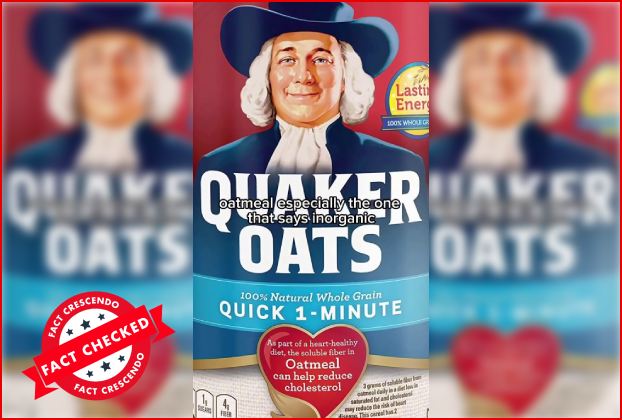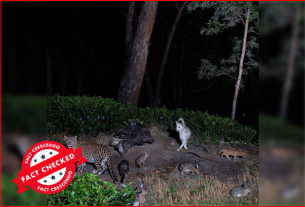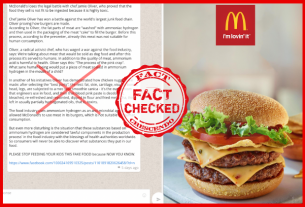Social media users are actively discussing the various qualities—both good and bad—of foods, particularly grains and other related products. However, some of this content is misleading, spreading inaccurate or false information about the health benefits, nutritional value, and safety of these foods. This misinformation can create confusion and potentially harmful misconceptions among the public.
Social Media Posts
A recent video circulating on social media platforms has sparked concerns by claiming that oatmeal, particularly the inorganic variety, is toxic to the body and can significantly reduce one’s lifespan. The video suggests that oatmeal is among the most heavily sprayed crops with pesticides, specifically mentioning glyphosate, a chemical that has been banned in several countries. The video warns viewers to avoid oatmeal unless in extreme survival situations, citing the detrimental effects of glyphosate on human health. Additionally, the presenter promotes a book titled “The Herbal Tablets,” which purportedly contains essential health information that can improve one’s well-being and longevity.
As an example for Oats products, we noticed that Quaker Oats brand used in above video.However, the video does not specifically targeting Quaker Oats brand.
The Quaker Oats Company, known as Quaker, is an American food conglomerate based in Chicago, Illinois. As Quaker Mill Company, the company was founded in 1877 in Ravenna, Ohio.
We decided to do a fact check on this.
Explanation
Where Do Oats Grow?
Oats, a plant characterized by open, spreading panicles bearing large spikelets, are primarily cultivated for breakfast foods and as fodder for horses and other livestock. They thrive in subtropical to temperate climates, where they are typically grown during the winter. In these regions, oats serve multiple purposes: as a winter cover crop, as food for both livestock and humans, and as raw material for various industrial uses.
Globally, more than 22 million tons of oats are produced annually. Russia is the leading producer, accounting for about a quarter of this production. Other top-producing countries include Canada, Poland, Australia, and Finland. The United States, Brazil, Spain, the United Kingdom, and Argentina also rank among the top ten oat producers. Overall, oats are planted in more than 70 countries worldwide.
Global Oats Production in 2023/2024: Top Producing Countries by Metric Tons. Image courtesy U.S. Department of Agriculture
Statistics on oat production in leading countries in 2023 can be found here.
Claim 1: “Oatmeal is the highest sprayed crop with pesticides, particularly glyphosate.”
Facts: Oat farmers work to grow a quality crop that is sustainable and safe. Glyphosate is one product commonly used by farmers to effectively control grass weeds prior to planting or after a crop is harvested. It also reduces disease and natural contaminants. Read more
Therefore, Oats are indeed one of the crops treated with glyphosate, a widely used herbicide. Glyphosate is commonly applied as a pre-harvest desiccant to dry out crops like oats before they are harvested. This practice helps control weeds and ensures uniform crop ripening.
However, the claim that oats are the “highest sprayed crop with pesticides” is misleading. While oats do receive glyphosate treatment, many other crops, such as soybeans and corn, are also treated with glyphosate and may receive higher overall pesticide applications depending on the region and farming practices. Read more
Research indicates that glyphosate residues in oat-based products are generally low and fall within the safety limits established by regulatory agencies such as the Environmental Protection Agency (EPA) and international bodies. The levels of glyphosate found in oat products are trace amounts, significantly below the thresholds considered harmful to human health. Full research details can be read here and here.
Further, The Environmental Working Group (EWG) reports that glyphosate, the active ingredient in Roundup and a herbicide linked to cancer, has been consistently detected in food products. In 2018, tests commissioned by EWG revealed that over 95 percent of popular oat-based food samples contained glyphosate. Recent tests on 12 wheat-based products, including dried pasta and cereal, showed glyphosate in all samples. The pasta samples had glyphosate levels ranging from 60 to 150 parts per billion, while cereal samples showed lower levels, often just above the limit of detection, likely due to the variety of wheat used or cross-contamination. Read more
Claim 2: “Glyphosate is extremely bad for your health.”
Facts: The health impacts of glyphosate have been the subject of extensive debate and research. The International Agency for Research on Cancer (IARC) classified glyphosate as “probably carcinogenic to humans” (Group 2A) in 2015, based on limited evidence in humans and sufficient evidence in experimental animals. However, other agencies, such as the EPA and the European Food Safety Authority (EFSA), have concluded that glyphosate is unlikely to pose a cancer risk to humans when used according to guidelines. IARC Monographs on glyphosate can be read here
Recent studies have raised concerns about potential health risks, including links to cancer, metabolic disorders during pregnancy may be associated with lower birth weight and shorter pregnancy and, metabolic diseases in kids. However, these risks are associated with long-term, high-level exposure, which is not typical of the trace amounts found in food products like oatmeal. Regulatory bodies continue to monitor and evaluate the safety of glyphosate.
Claim 3: “Glyphosate is banned in many countries.”
Facts: Glyphosate has been banned or restricted in several countries due to health and environmental concerns. Countries like Germany, Mexico, and Vietnam have implemented bans or announced plans to phase out glyphosate.
Which countries banned Glyphosate? Can be found here
However, it is not banned universally, and many countries, including the United States, Canada, and several EU nations, continue to allow its use under regulated conditions.
Glyphosate in Sri Lanka
In Sri Lanka, glyphosate was banned in 2015 due to concerns about its potential link to chronic kidney disease. However, the ban was lifted in 2022 due to the lack of conclusive scientific evidence. Read more
The herbicide is now permitted under strict regulations.
Registered Glyphosate Products in Sri Lanka: Find the list here
Illegal Pesticides in Sri Lanka: Find more information here
The presenter promotes a book called The Herbal Tablets in the video, claiming that it reveals information “they don’t want you to know.” According to him, this book shows everything you need to avoid for a healthier life. He asserts that by reading and applying the principles in this book, you will not only feel and look better but may also add years to your lifespan. Find the book here
Follow us and stay up to date with our latest fact checks.
Facebook | Twitter | Instagram | Google News | TikTok
Conclusion
In summary, the claims made in the viral video contain elements of truth but are presented in a misleading manner. While glyphosate is used on oats and has been linked to health risks in certain contexts, the levels found in food products are generally considered safe by regulatory bodies. The claim that oatmeal is one of the most pesticide-heavy crops and should be avoided entirely is an exaggeration not supported by the broader scientific consensus. Additionally, while glyphosate is banned in some countries, it remains widely used and regulated in many others.

Title:Fact-Check of the Viral Video Claims about Oatmeal and Glyphosate
Fact Check By: Fact Crescendo TeamResult: Missing Context






